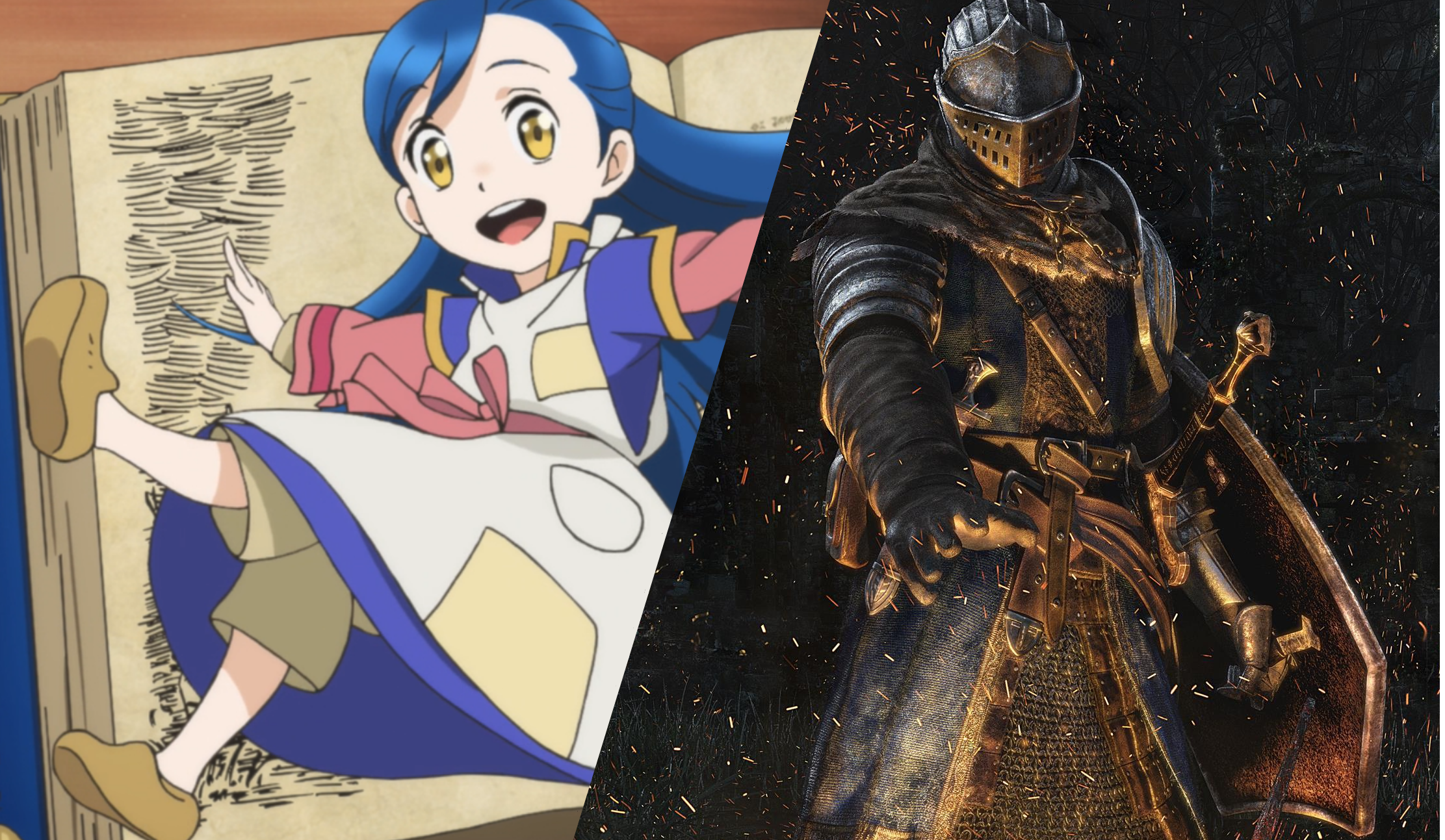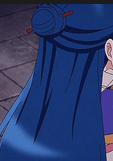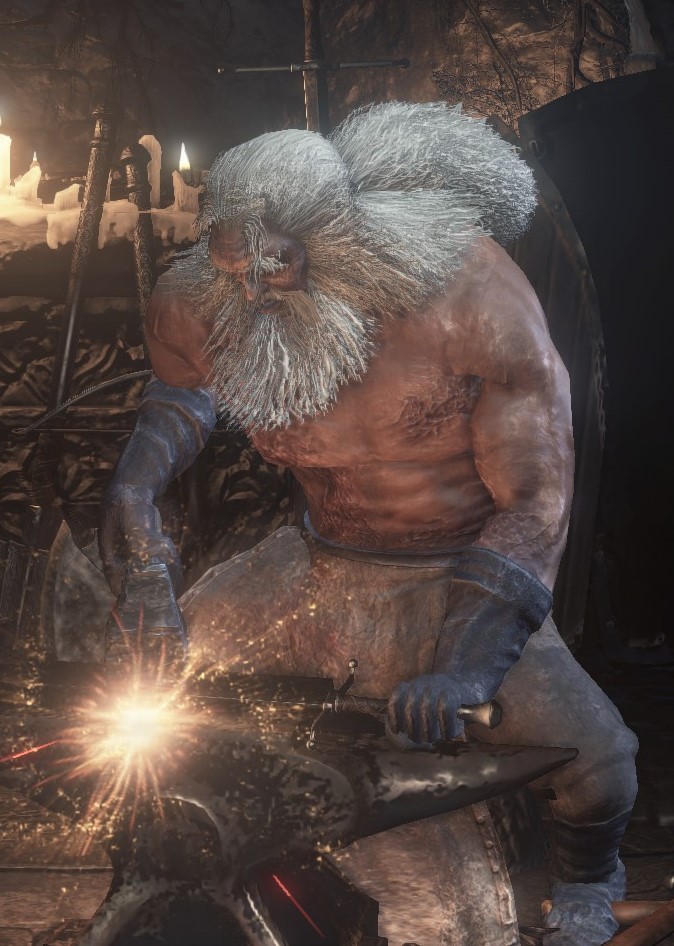Ascendence of a Dark Soul : An Ode to Discovery

This is a tale of two pieces of media that happened to cross my paths at the same time: Ascendence of a Bookworm (AooB) and Dark Souls (DS), and the lessons that they teach us about life. For the unaquainted, the former is a sleeper hit of an isekai anime which subverts the genre by not being awful. The latter is the first entry from the delightfully difficult Dark Souls trilogy, which has brought enough ingenuity to the gaming landscape to spawn its own subgenre called Souls-like. Both are triumphs of their respective mediums, and one will find no shortage of praise for them. However, I have not gathered you here to simply explain why I think they are great. Rather, we are all here to understand:
What on earth could a wholesome anime and a grimy RPG have in common?
We’ll get there, I promise.
Ascendence of a Bookworm
Enter Urano: college student studying to become a librarian. Enter bookshelf: plot-driving furniture which ironically crushes previously introduced protagonist during an earthquake. A sad start to any story, but this is an isekai. This means that Urano will shortly be transported to another world. Urano awakens as a sickly peasant child named Main (pronounced mai-een).
Typically in an isekai anime, an author might be tempted to info-dump an entire world onto the newly incarnated protoganist. This is a pretty lame way to get a show started, but low hanging fruit sometimes tastes the sweetest (or helps to meet deadlines, at least). Learning about the world through this common trope expressly removes the joy from organically discovering facts and details about the brand new places, people, magic, and whatever else that might await. This sort of discovery is one of the few ways that a passive medium (watching a show) can make itself active and engaging. As an isekai, AoaB is special because it is written for moments of genuine discovery using two particular plot details.
The first is that the characters around Main are not aware that she was isekai’d, so there is no convenient reason for someone to offer her a compedium of basic facts about the new fantasy world. Given that the audience’s knowledge of the world closely follows Main’s, we must learn alongside Main and experience the same restrictions as she does.
The second is clever. Main starts life in the new world in one of the most unpriviledged groups of her society: a child peasant in a bookless society. What little information the people around her can offer is mostly restricted to that of plebian life. It takes many episodes - and many years of Main’s life - for the details of the greater societal structure to be revealed. Yet, it is never a complete picture. The world’s magic gets a similar treatment, as it is deeply entangled with the hierarchies of the society. Despite Main’s nontrivial relationship to magic, Main is never offered a straightforward explanation of the magical system: what does a peasant girl need to know about the complicated facets of the world?
The key choices made by the author of AoaB opens the door to genuine interaction and exploration of their world. I’ll attempt to convey its impact on the story while avoiding spoilers.
 Shortly after Main is reincarnated, one of her first observations is NOT that she suddenly feels great power within, or that a video game UI has popped up in her vision. Rather, it is that her hair feels gross and she wants to put it up in a bun. To do this she first asks her sister, Tuuli, if she can break a leg off of her doll to use as a hair stick. Protective of her toy, Tuuli offers to carve her one instead. When Main puts her hair up using the carved stick Tuuli scolds Main, reminding her that only adults are allowed to put their hair up. Main comprimises, holding up half of her hair with the sick and letting the rest lay free: a symbol of her status as a mix of adult and child.
Shortly after Main is reincarnated, one of her first observations is NOT that she suddenly feels great power within, or that a video game UI has popped up in her vision. Rather, it is that her hair feels gross and she wants to put it up in a bun. To do this she first asks her sister, Tuuli, if she can break a leg off of her doll to use as a hair stick. Protective of her toy, Tuuli offers to carve her one instead. When Main puts her hair up using the carved stick Tuuli scolds Main, reminding her that only adults are allowed to put their hair up. Main comprimises, holding up half of her hair with the sick and letting the rest lay free: a symbol of her status as a mix of adult and child.
Main’s strong will and deep desire to understand how the world around her can faciliate her goals drives the cycle of “moments of discovery” throughout AoaB. The world feels open and alive as a result. I also think that the viewers are invited to participate in this process. There are many examples of implicit world building that we can tune into and piece together. The relationship between Main’s strata in society and writing is conveyed by some bits of dialogue, but also can be enhanced by paying close attentioned to the environment. Shopkeepers do not use words on their signs. Instead pictures of objects are used to indicate the kind of wares they sell. The scripts that are used are primarily for numbers, to faciliate the exchange of currency at markets. Writing is exclusively functional. The few people who can read and write full language are those who interact with nobles, and do so as a necessity of their professions. Most of this isnot spelled out by character exposition, but is the reward of paying close attention to the world as seen through Main’s eyes.
However, we are still often passive while watching. Main makes the choices, and what we see and where we go is determined by her. What if we want to experience discovery first-hand by making our own observations, decisions, and risks? A common way to put oneself in these shoes is to pick up a video game, say a copy of…
Dark Souls
I am not sure I am prepared to convey how unique of an experience the Dark Souls genre is. I will try. The setting is reminiscent of the biblical book revelations, except if salvation for never came. One traverses the lands as a hollow, having lost your humanity. You seek to become king and revitalize the lands, as every hollow does until they truly lose themselves to the abyss. The unforgiving gameplay matches this brutal setting, but those who persevere in the search for hope can always find it.
At this point I am sure you are dying to see how this ties in to AoaB - so am I.
Much like AoaB, Dark Souls drops the player into a grand fantasy world with very little context. Vague story details are dropped in the opening cutscene, but little more is handed to the player directly. Throughout the game, the player gleans an understanding of the world by experiencing it directly and interacting with items and NPCs. However, at no point is the “situation” clearly laid out for the player. Confusion abounds, and obfuscation of detail is a rule. Frequently, one much interpolate between nebulous clues in order to form a coherant picture of what is going on. This expressly reflects the actual reality of the character played in game. The few friends and guides you meet along the way may or may not have your best interests in mind; their brief comments could be designed for your success or demise. There is no overseer who makes sure you are doing the right thing at the right time in the game. In fact, there really is no such concept of that in Dark Souls. As one continues through the game, a player realizes there are actually many ways they could have arrived where they are, even if it felt like they were progressing linearly. An area first accessed after many dozens of hours of playtime might have been just a few steps away from the starting area, if only one had known where to look.
The gameplay itself also contains traces of this ambiguity. The franchise prides itself on keeping its algorithms and formulas secret. Often times the best explanations you can find for a mechanic is a mixture of empirical research and anecdotal conjecture. The in-game explanations of character and equipment attributes are parsimonious at best. The purpose and function of certain items are never clearly laid out. Hidden walls may or may not be revealed, depending on how often a player is willing to take random swings at walls.
I could go on. I am in love with the whole ethos of Dark Souls - but I think its time to wrap things up.
While the lack of guidance and structured gameplay may be a turn off for many, I believe it enhances the experience of discovery. In AoaB, we saw how writing decisions allowed for very organic and satisfying moments of story-telling and world-building. In Dark Souls, I see decisions made with similar goals in mind. No two Dark Souls players will have the same experience. Their understanding of what the plot is, the order that they explore areas, the secret paths they uncover, the items they use, and so on all will vary greatly as there is little the game offers to structure these experiences. I think as a game design decision, this forms a much stronger bond between who you are and how you play the game and the resulting experience you have while playing.

Not too long ago, I decided to dip back into my Dark Souls file (after focusing on Elden Ring for some time). I found myself frustrated with my ability to progress in the game. I felt like all I could do is hit dead ends or situations I did not feel prepared to handle. However, I knew of an area that was locked by an item I could buy. It was an expensive item though. I also knew of a way around the price tag. Murder the friendly blacksmith who sold the item. I did that, and I could finally progress in a new area. The catharsis provided by progress was curbed by the guilt I felt. The blacksmith had provided me with great services and words of encouragement throughout most of my playthrough. Driven by the madness of impatience, I culled him easily. I look back at this moment as exactly the sort of experience I love Dark Souls for. A permanent consequence (murdering a comrade) was incurred by my mood (impatient). I really felt "in the game" at that moment. Who I was and what I was feeling directly impacted my gameplay. I will never trade with that blacksmith again, nor will I hear him call out "Don't go hollow on me, now."
Writing for Discovery
AoaB and Dark Souls exemplify a grand feat. The careful design of these pieces of art facilitate the emergence of beautiful moments of discovery. I think too often media can be passive and one-sided, with little openings for the individual to explore on their own terms. There is great value to withholding the complete “picture” from the audience. Letting viewers and players connect dots, stumble into hidden corners, and be involved in the process of understanding brings so much depth to these works. Passivity, to some degree, is inherent in watched works like TV and Movies, but I think AoaB shows how this doesn’t have to be the full story. I could rant for days about Dark Souls. There is so much more to be said about how all aspects of the game, big and small, come together to build unforgetable gameplay and storytelling.